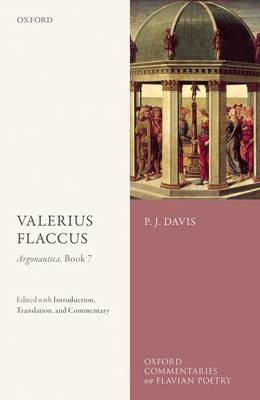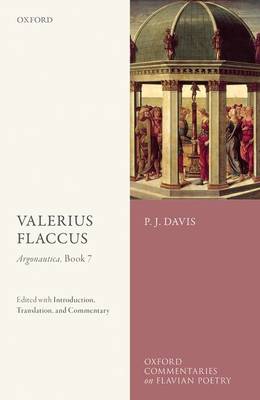
Onze Vivlio e-readers ondervinden momenteel synchronisatieproblemen. We doen er alles aan om dit zo snel mogelijk op te lossen. Onze excuses voor het ongemak!
- Afhalen na 1 uur in een winkel met voorraad
- Gratis thuislevering in België vanaf € 30
- Ruim aanbod met 7 miljoen producten
Onze Vivlio e-readers ondervinden momenteel synchronisatieproblemen. We doen er alles aan om dit zo snel mogelijk op te lossen. Onze excuses voor het ongemak!
- Afhalen na 1 uur in een winkel met voorraad
- Gratis thuislevering in België vanaf € 30
- Ruim aanbod met 7 miljoen producten
Zoeken
Valerius Flaccus: Argonautica, Book 7
Edited with Introduction, Translation, and Commentary
P J Davis
€ 150,45
+ 300 punten
Omschrijving
The story of Jason and the Argonauts is one of the best known of ancient Greek myths and has captivated people for over two and a half thousand years. Focusing on Medea's attempts to resist her love for Jason, Book 7 of Valerius Flaccus' Argonautica presents one of the most attractive and engaging episodes in all of Greco-Roman epic: the key moment when Jason and Medea fall in love and when Jason, with Medea's help, yokes the king's fire-breathing bulls, sows the dragon's teeth, and compels the earthborn men to destroy themselves. Although versions of the story of the Argo's journey from Greece to the Black Sea had been told by many earlier poets, this Roman account of the myth differs from its predecessors in important ways. First, Valerius presents the Argo as the first ship and the voyage as a decisive turning point in human history: the Argo's breaking down of natural barriers will lead to interchange between human communities and to a sequence of empires, culminating of course in that of the Romans. Second, Valerius constantly foreshadows other parts of Medea's myth, most notably the explosion of violence in Corinth well known to Valerius' audience and to us from the Medea tragedies of Euripides and Seneca. Third, and most important, Valerius concentrates attention on the inner workings of Medea's mind as she fights against the combined efforts of two goddesses who ultimately compel her to betray her father and help Jason to win the golden fleece. This new edition of Argonautica 7 offers the first detailed commentary on this book of the poem in English, as well as a substantial introduction intended to be as accessible to as many readers as possible, a new Latin text, and a facing-page prose translation. The commentary is primarily literary, emphasizing Valerius' engagement with the epic tradition and with earlier treatments of the Medea story, as well as the elegance and power of his poetry, and is intended to be of use to scholars and students at all levels of study
Specificaties
Betrokkenen
- Auteur(s):
- Uitgeverij:
Inhoud
- Aantal bladzijden:
- 320
- Taal:
- Engels
- Reeks:
Eigenschappen
- Productcode (EAN):
- 9780198767190
- Verschijningsdatum:
- 7/05/2020
- Uitvoering:
- Hardcover
- Formaat:
- Genaaid
- Afmetingen:
- 155 mm x 236 mm
- Gewicht:
- 657 g

Alleen bij Standaard Boekhandel
+ 300 punten op je klantenkaart van Standaard Boekhandel
Beoordelingen
We publiceren alleen reviews die voldoen aan de voorwaarden voor reviews. Bekijk onze voorwaarden voor reviews.











